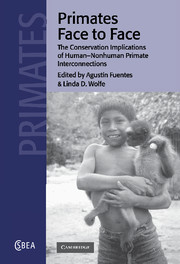Book contents
- Frontmatter
- Contents
- List of contributors
- Foreword
- Acknowledgements
- Introduction
- Part 1 Science and nonhuman primates
- Part 2 Cultural views of nonhuman primates
- Part 3 Conservation of nonhuman primates
- Part 4 Government actions, local economies and nonhuman primates
- 13 The primatologist as minority advocate
- 14 Monkey business? The conservation implications of macaque ethnoprimatology in southern Thailand
- 15 Rhesus macaques: a comparative study of two sites, Jaipur, India, and Silver Springs, Florida
- Index
13 - The primatologist as minority advocate
Published online by Cambridge University Press: 20 October 2009
- Frontmatter
- Contents
- List of contributors
- Foreword
- Acknowledgements
- Introduction
- Part 1 Science and nonhuman primates
- Part 2 Cultural views of nonhuman primates
- Part 3 Conservation of nonhuman primates
- Part 4 Government actions, local economies and nonhuman primates
- 13 The primatologist as minority advocate
- 14 Monkey business? The conservation implications of macaque ethnoprimatology in southern Thailand
- 15 Rhesus macaques: a comparative study of two sites, Jaipur, India, and Silver Springs, Florida
- Index
Summary
Introduction
As a graduate student preparing to enter the field for the first time, I was admonished by a senior faculty member to remember that I was an anthropologist as well as a primatologist. His words struck a very responsive chord because I never forgot them during my initial fieldwork on primates, or subsequently. As a consequence, the conceptual framework of this book appeared to offer me an opportunity to incorporate my own experience into my contribution, almost as if I were utilizing myself as an anthropological informant. There may even come a stage in one's career when the weight of professional experience begins to require more personal expression: Oates' (1999) examination of the loss of West African rainforest ecosystems is a recent example.
My career as a ‘monkey watcher’ may have begun somewhat differently from that of the other contributors to this volume. As a graduate student, I proposed to examine the process of speciation (in mammals) by looking at behaviors such as ecological preference that were thought to keep closely related sympatric species – in this case macaque monkeys (Macaca spp.) in west-central Thailand – reproductively isolated from one another (Eudey, 1980, 1981). At that time, although not subsequently, actual elucidation of an aspect of the monkeys' behavior was not a motivating factor.
- Type
- Chapter
- Information
- Primates Face to FaceThe Conservation Implications of Human-nonhuman Primate Interconnections, pp. 277 - 287Publisher: Cambridge University PressPrint publication year: 2002
- 2
- Cited by

